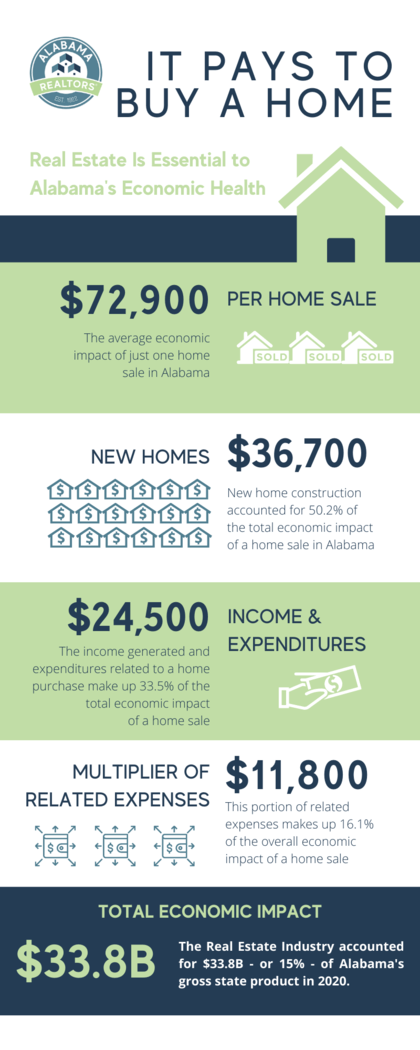
Real Estate Essential to Alabama’s Economic Health
June 22, 2021
Real estate is more than an industry, a profession or a service. In Alabama, the real estate industry is essential to the state’s economic wellness and growth, and the numbers prove it. The real estate industry accounted for $33.8 billion – or 15 percent – of Alabama’s gross state product in 2020, according to a study by the National Association of Realtors® (NAR).
“The housing market is a driving force in our economy,” says the Federal Home Loan Mortgage Corporation (Freddie Mac). “It's the thread that runs through all aspects of our local and national economies, from construction to manufacturing. Homeowners also tend to buy more goods and use more services in their communities, further benefiting the economy.”
Economic impact is clearly seen in the industry’s direct contributions to the state’s economy in key areas:
- Home construction
- Real estate brokerage fees and commissions
- Mortgage lending
- Title insurance
- Rental and Leasing
- Home appraisal
- Home inspection
- Moving services
Consumer spending on real estate transactions generates related economic impact through:
- Remodeling expenses
- Furniture purchases
- Appliance purchases
Home sales also lead to new home construction. “Typically, one new home is constructed for every six existing home sales. Thus, for every existing home sale, 1/6 of a new home's value is added to the economy,” according to NAR.
Less visible, but vitally important, is the impact of the “multiplier effect” – income earned in other sectors of the economy as a result of a home sale that is then re‐circulated into the economy. Restaurants, retailers, and service providers all benefit from real estate sales as more income allows customers to spend more.
Real estate sales also create a ripple effect for local communities, according to personal finance website The Balance. Higher sales prices increase the value of all homes – even those not on the market. In turn, more home equity is available to owners allowing consumer spending to rise. Consumer spending contributes to economic growth, employment and income.
The bottom line: A healthy real estate industry in Alabama significantly contributes to healthy overall state and local economies where businesses thrive and neighbors enjoy and contribute to their communities.
Here’s a snapshot of the economic impact made by a typical home sale in Alabama:
Total Economic Impact: $72,900
Income Generated from Real Estate Industries: $19,800 (27.1%)
Expenditures Related to Home Purchase: $4,700 (6.4%)
Multiplier of Housing Related Expenditures: $11,800 (16.1%)
New Home Construction: $36,700 (50.2%)
Downloadable Resources:
